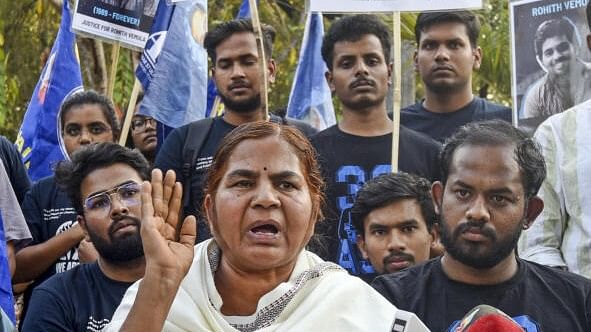
Former University of Hyderabad student Rohith Vemula's mother Radhika Vemula.
Credit: PTI Photo
A collective called Bangalore for Rohith Vemula is demanding a reinvestigation of the circumstances leading to the death of the PhD scholar.
On May 3, the Hyderabad police closed their investigations, concluding that Vemula was not a Dalit.
In the closure report, they said Vemula was worried that his real identity would come out, which could have led to his death by suicide.
Bangalore for Rohith Vemula comprises students and artists, and organisations such as Adavi Arts Collective, All India Lawyers Association for Justice, All India Students Association, Ambedkar Reading Circle Bengaluru, Bahutva Karnataka, Jagruta Karnataka, Jangama Collective, NLS Feminist Alliance, Students for People’s Democracy, and Students Islamic Organisation.
Its statement seeks justice for those “who have suffered and continue to suffer from institutionalised caste violence”. Issued on May 4, it says placing the blame on Vemula “is nothing but a feudal casteist act of the Telangana Police”.
Maitreyi Krishnan from the All India Lawyers Association for Justice says, “Currently it feels like Vemula is on trial, which is improper. In a joint statement, our association has mentioned how the report is highly erroneous.”
Political leaders named in the case are being protected, the victim is being victimised even more, she told Metrolife. The Adivasi and Dalit community is not represented enough at institutions of higher learning, and that creates problems, she says.
Dalit rights activist V L Narasimhamurthy says the closure of the case shows “continued injustice”. “Vemula died by suicide because of the torture he suffered at the institution. This police report is trying to malign his image and memory,” he says.
When Vemula died, several organisations held protests in Karnataka, but most chose to stay quiet when this report came out, he says.
Vemula’s worst fears about the victimisation of Dalits in higher education have become true with this report, says Kannada lecturer and Dalit activist Hulikunte Murthy.
“I have been in touch with his mother Radhika Vemula for eight years. We have told her that there are lakhs of (Rohith) Vemulas in India, suffering in silence. The fight against such injustice must be constant and strong,” he says.
Theatre actor-director Lakshman K P, who worked on a play based on the last letter Vemula wrote, says the student leader’s death affected him personally.
“It is important to talk about the case now as the isolation (mentioned in Vemula’s last letter) of students from marginalised communities is real,” Lakshman adds.
Roy Anto, co-founder of Ambedkar Reading Circle, says Vemula’s death woke him up to social realities in educational institutions in 2016. “The death impacted the whole country. The closure report is absolutely unfair as it goes on about his identity rather than his death,” he says.
He despairs that complaints about caste discrimination are not taken seriously in many institutions. “Vemula’s last letter pricked the conscience of our country, even those who don’t share his ideologies and background stood for him,” he says.
In his view, in cities like Bengaluru, “not much discussion on caste exists and not enough cells exist where such discrimination cases can be reported”.
What happened?
Rohith Vemula was a PhD scholar at the University of Hyderabad. In his capacity as a leader of the Ambedkar Students Association, he started questioning the university authorities on many issues. The university subsequently stopped paying him his monthly stipend of Rs 25,000. He died by suicide on January 17, 2016. His death led to protests across the country. The police were looking into whether he had faced caste discrimination. On May 3, they closed the case. Soon after, a top cop in the Hyderabad police alleged discrepancies in the report and added that a petition will be filed in court seeking to reopen the investigation.